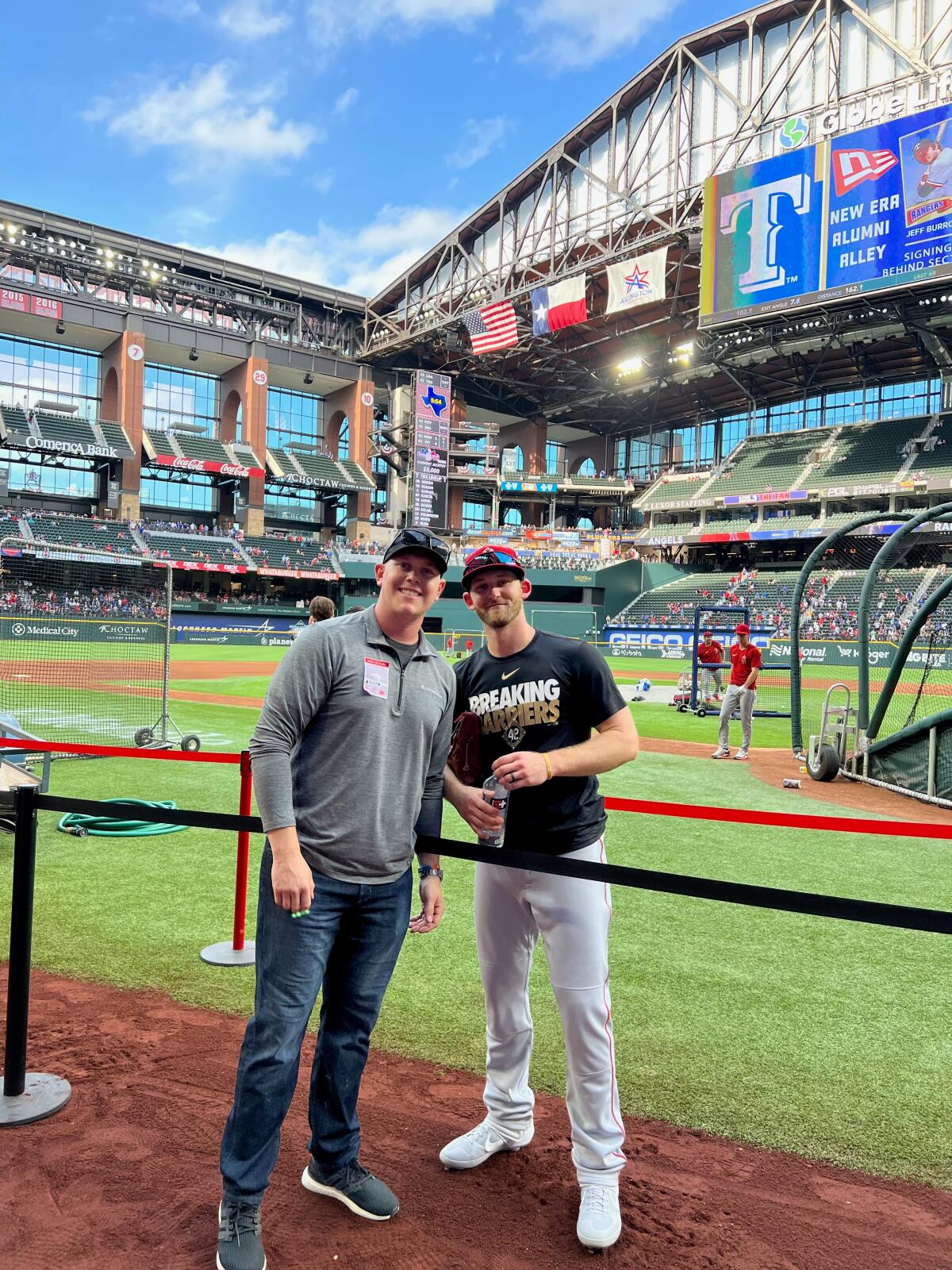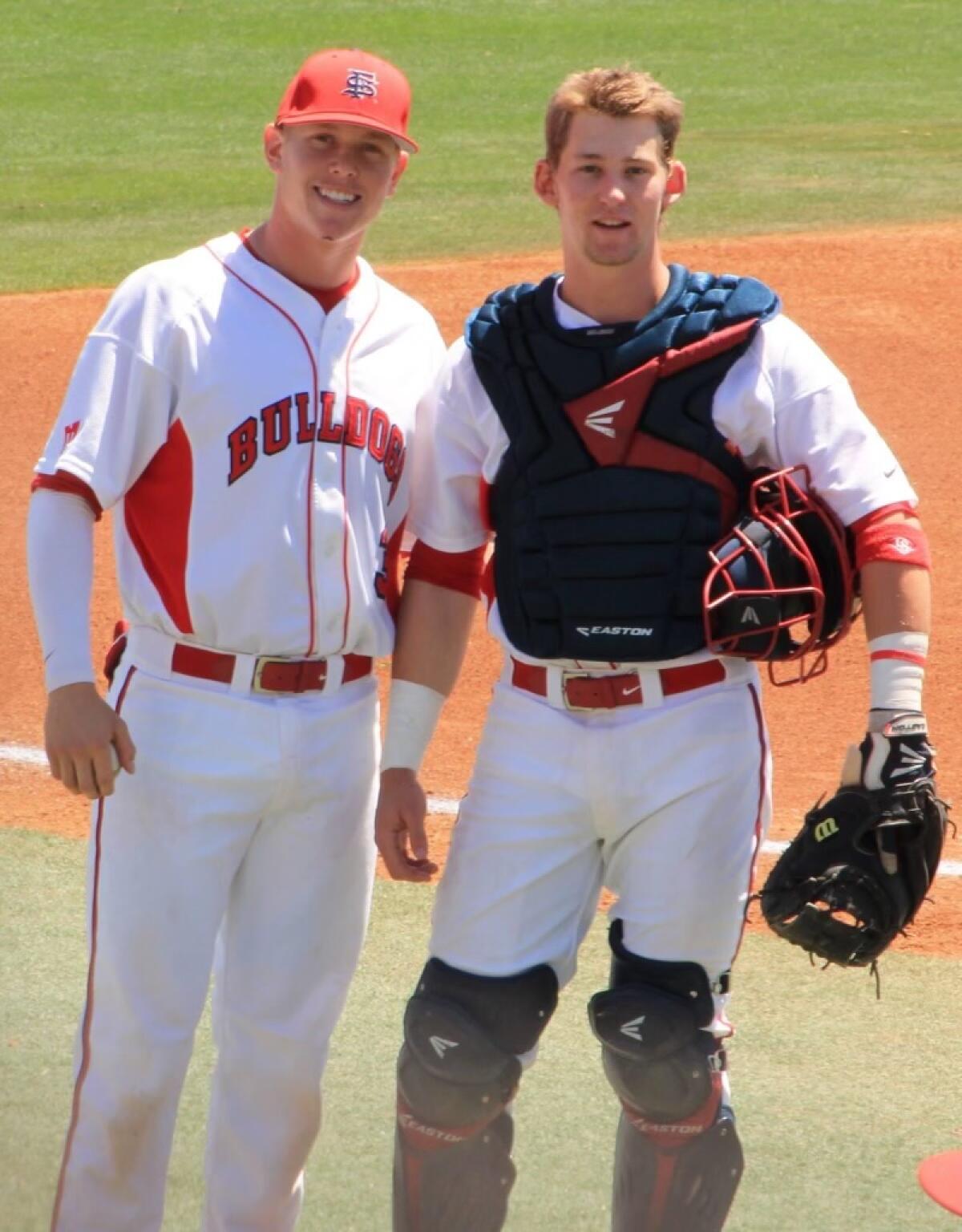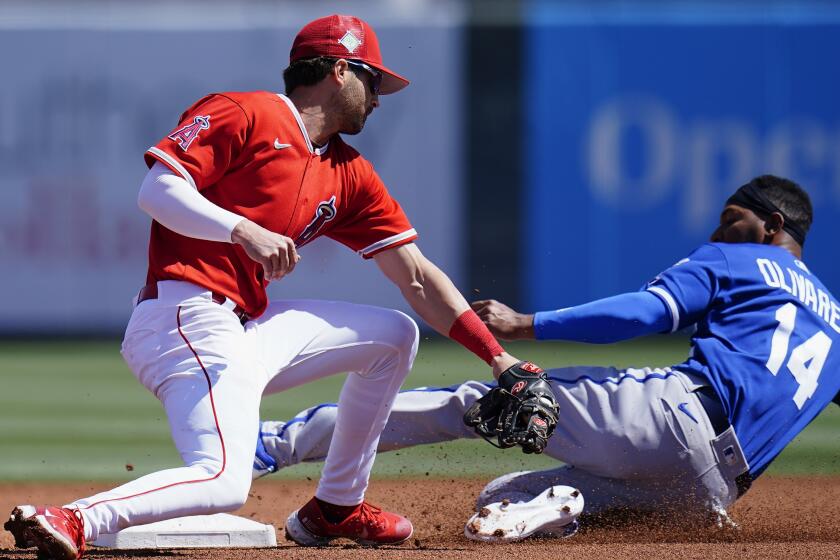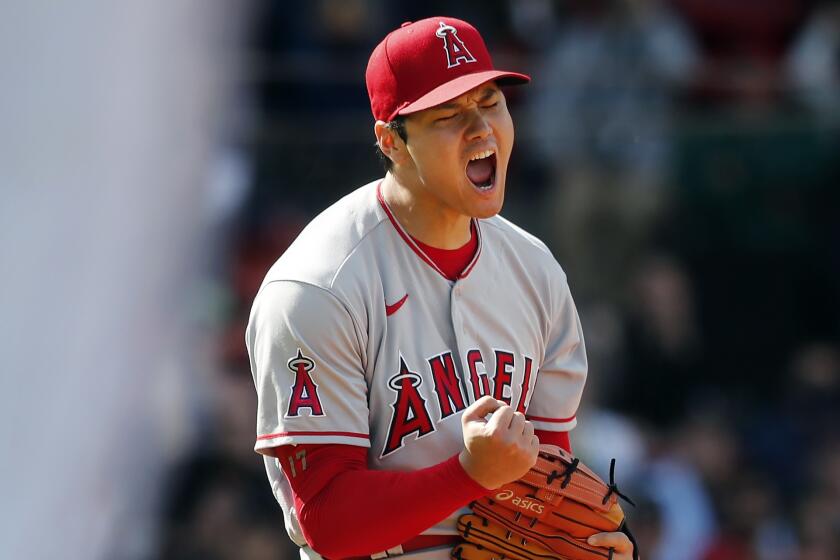With help from an old friend, Taylor Ward has become one of Angels’ top hitters

- Share via
Taylor Ward and Trent Woodward, former college teammates and roommates at Fresno State, were talking about hitting at an Inland Empire batting cage in the winter of 2017-’18 when Ward’s ears perked up.
Hip surgery had just ended Woodward’s playing career after four minor league seasons with the Houston Astros, but the information he began sharing about swing mechanics and advanced analytics that day planted a seed that would help Ward blossom into a budding star for the Angels.
“He just got very intrigued,” Woodward, speaking by phone from his home in Austin, Texas, said of Ward. “He started making some mechanical adjustments to have a more efficient and explosive swing and to keep him in the hitting zone as long as possible … he was willing to try anything and everything.”
Tyler Wade, who will be splitting time at second base for the Angels this season, explains why he’s happy to be back in Southern California.
Ward, a first-round pick of the Angels in 2015, was coming off an OK-but-not-great 2017 season split between Class-A and double-A, the third straight year in which the defensive demands of catching weighed him down at the plate.
The Astros, at the forefront of baseball’s technological revolution, were among the first teams to use TrackMan to measure the location, trajectory and spin rate of hit and pitched balls, Blast Motion to measure what a hitter’s bat is doing in space, and K-Vests to measure the kinematic sequencing of a hitter’s movements.
Woodward told Ward about the hitting concepts he had learned, things like “early connection,” the relationship between the body’s tilt and the bat angle at the start of the downswing, “attack angle,” the angle the bat enters the hitting space, and how to create the perfect ellipse of a bat path.

“I don’t believe I signed a non-disclosure agreement or anything like that,” Woodward said, when asked if he was sharing any proprietary information with Ward. “I think the Astros were still collecting information at the time and trying to figure it all out. Taylor had the ability to understand and comprehend it. He embraced and embodied every bit of it.”
Four years and two position switches later — from catcher to third base in 2018 and third to the outfield in 2019 — Ward, 28, has married the swing he revamped with Woodward with a mental approach honed by current hitting coaches Jeremy Reed and John Mallee to emerge as an offensive force for the Angels.
Ward hit a tie-breaking two-run homer in the 10th inning of Wednesday night’s 10-5 win in Fenway Park, and he entered Friday night’s game against the Washington Nationals with a .368 average, a major league-leading 1.197 on-base-plus-slugging percentage, six homers, four doubles, one triple, 15 RBIs, 17 strikeouts and 14 walks in his first 19 games.
After missing the first week of the season because of a groin strain, Ward was so productive and patient in his first eight games that manager Joe Maddon moved the right fielder to the leadoff spot on April 25.
Ward hit two homers in a 3-0 win over Cleveland that night, and he doubled, tripled and homered in a 9-5 win over the Guardians two nights later, part of a seven-game stretch in which he hit .448 (13 for 29) with a 1.484 OPS, four homers and 11 RBIs earn American League player-of-the-week honors.
Shohei Ohtani strikes out 11 over seven shutout innings and Jared Walsh surges at the plate late in the Angels’ 8-0 win over the Red Sox.
“I did a lot of swing changes with my guy, Trent Woodward,” Ward said. “He learned a lot while he was with the Astros and filled me in on the philosophies they were learning at the time. I’ve taken those to heart and have really taken them to another level, and that’s really what helped me.”
So did his initial position switch, which freed Ward from the physical rigors of catching and the stress of game-planning and calling pitches.
“Getting out from behind the plate helped my offense explode,” said Ward, a graduate of Shadow Hills High in Indio. “I could focus solely on my hitting.”
Ward shuttled between triple-A and the big leagues from 2018-2021, usually crushing the ball at Salt Lake but unable to seize a position—and the regular at-bats that come with it — to hit consistently in Anaheim.
But he unlocked some more power in 2021, when he hit .250 with a .769 OPS, eight homers and 33 RBIs in 65 games for the Angels.
Ward’s plate discipline and at-bat quality were so strong this spring that the Angels released Justin Upton, eating the $28 million left on his contract, to clear an outfield spot for him. It was clearly the right move.
“He controls the strike zone as well as anybody we have,” Reed said, “but now he’s maturing to the point where he understands how to get to the pull side a little more, and there’s more damage in what he does.”
Ward said Woodward helped him “eliminate all inefficiencies and wasted movement” in his swing. Ward’s first major adjustment in 2018 was to hold his bat at a 90-degree angle to his spine and to maintain that connection as he plants his front foot, rotates his body and brings his hands through the hitting zone.

“We started with Blast Motion information in the cage and did different sessions with the K-Vest to make sure his hips, torso, shoulders and hands are accelerating and decelerating in an appropriate manner,” Woodward, 30, said. “We wanted to put him in good positions where he doesn’t hit with his hands.”
Ward saw immediate results in the minor leagues, where he hit .349 with a .977 OPS, 14 homers, 26 doubles and 60 RBIs in 102 games in 2018 and .306 with a 1.011 OPS, 27 homers, 34 doubles and 71 RBIs in 106 games in 2019. Now, his swing is producing at the big league level.
“It allows you to be in the zone for a long time and to match the plane of the pitch, so when you get beat, you can still dunk it over the first baseman’s head,” Ward said of his swing. “And when you’re on time and catch it out front, that’s where your doubles and homers are hit. Every time I take a swing, I want to keep it simple. With great mechanics and a great approach, the sky’s the limit.”
The comfort and confidence Ward has in his swing has forged a Zen-like approach in the box. Ward doesn’t so much anticipate — or guess — pitches as he does react to them. The count doesn’t matter.
Both of his homers on April 25 came on full-count pitches, a 91-mph fastball and an 85-mph cutter, from 2020 AL Cy Young Award winner Shane Bieber.
“It doesn’t bother him to go deep into counts — he’s gonna get that same A hack off,” Maddon said. “He’s going to normally lay off the bad pitches and swing at the good ones.”
On April 24, the day before his two-homer game, Ward capped a nine-pitch at-bat with a bases-loaded walk to drive in the winning run of a 7-6 victory over the Baltimore Orioles.
Taylor Ward, who stalled at one point in the minor leagues because of his offensive production, has been hot for the Angels after redesigning his swing.
“His at-bats are some of the best I’ve ever seen, to be honest,” said Angels right-hander Michael Lorenzen said. “Even in spring training, his takes were incredible. If I were to start hitting again, I’d probably try to be like him.”
Woodward’s hitting days are also behind him. The former catcher and corner infielder from Chino Hills has declined offers to become a hitting coach, saying he loves his job selling spine implants for a medical supplies company and a stay-at-home lifestyle with his wife, who is expecting their first child in June.
But Woodward still watches every one of Ward’s at-bats with the eye of a coach and the heart of a pal.
“He’s having a phenomenal month, but I believe in the athlete, the competitor, the hitter and his ability, and I’m pretty confident that this is the type of player he is,” Woodward said. “He probably gives me way too much credit. I’m just a friend who’s watching and enjoying his success.”
More to Read
Go beyond the scoreboard
Get the latest on L.A.'s teams in the daily Sports Report newsletter.
You may occasionally receive promotional content from the Los Angeles Times.










